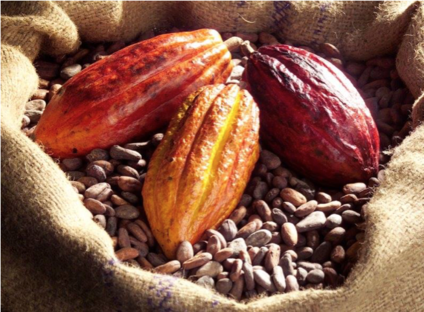That is, cognitive function is improved with a diet high in cocoa flavanols—a group of naturally occurring bioactives found in fresh cocoa beans
A new double-blind study demonstrates that cocoa flavanols—the bioactives found in fresh cocoa beans, which are often diluted during the roasting/chocolate-processing process, despite our intentionally incendiary headline—can improve cognitive functioning.
The study is published in the American Journal of Clinical Nutrition (AJCN), despite being sponsored by Mars, Incorporated, which as a chocolate candy producer probably has a vested interest in the outcome of the study—but who else would fund this research? Researchers from Italy’s University of L’Aquila and Mars, Incorporated, assigned men and women aged 61-85 years with no evidence of cognitive dysfunction, to one of three flavanol groups, consuming a drink containing either high (993 mg), intermediate (520 mg) or low (48 mg) amounts of cocoa flavanols every day for eight weeks. The high- and intermediate-flavanol cocoa drinks were produced using Mars’ patented Cocoapro® process, while the low-flavanol drink was made with a highly processed, alkalized cocoa powder. Note: This test product is currently not commercially available.
At the start of the study and again after eight weeks, cognitive function was assessed using a battery of tests that examined memory, retention, recall, as well as executive function. Among those individuals who regularly consumed either the high- or intermediate-flavanol drinks, there were significant improvements in overall cognitive function after only eight weeks.
Dr. Giovambattista Desideri, lead author on the paper, said, “The results of this study are encouraging—they support the idea that diet, and specifically a diet rich in cocoa flavanols, can play an important role in maintaining cognitive health as we age.”
It is not yet fully understood how cocoa flavanols bring about improvements in cognitive function, but the study’s authors suggest that the improvements in insulin resistance and blood pressure could be revealing. “Earlier studies suggest a central role for insulin resistance in brain aging,” said Desideri.
In fact, in the high- and intermediate-flavanol groups, both systolic and diastolic blood pressures were reduced and insulin resistance was significantly improved. In contrast, only a modest improvement in diastolic blood pressure was observed in the low-flavanol group, with no significant improvements in either systolic blood pressure or insulin resistance among the consumers of the low-flavanol drink.
Dr. Catherine Kwik-Uribe, human health and nutrition director at Mars, Incorporated, and co-author on this latest study, says, “Since the brain is a heavily vascularized tissue, we might also be looking at vascular improvements as underlying the observed improvements in cognitive function.”
Until that flavanol drink is commercially available, we’ll just have to content ourselves with more research proving that raw, unprocessed cocoa (cacao) is good for you … someone pass me the nibs.
For more information, please visit Mars Center for Cocoa Health Science. In 1911, Frank C. Mars made the first Mars candies in his Tacoma, Washington kitchen; today Mars has net sales of more than $33 billion, six business segments including Petcare, Chocolate, Wrigley, Food, Drinks, and Symbioscience. Photo by Mars, Inc.

